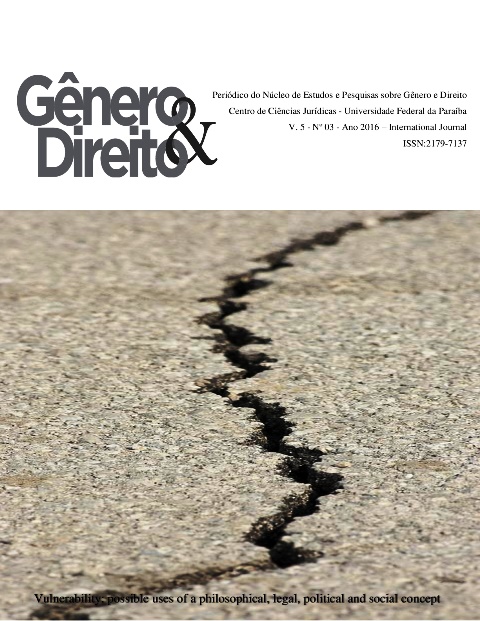IL FILOTTETE DI SOFOCLE: UNA RIFLESSIONE SU VULNERABILITÀ E POLITICA
Palavras-chave:
Philoctetes, Political, Vulnerability, CareResumo
Sophocles’ Philoctetes is a play about vulnerability. The wretched hero became the symbol of human frailty. The social vulnerability adds to the ontological vulnerability, when Philoctetes’ companions abandoned him in Lemno for ten years, because of his smelly wound and loud cries. But Atrides needed Philoctetes and his bow for winning Troy war. The plot of Odysseus of taking back Philoctetes to Troy with the understanding of young Neoptolemus is foiled because of the pity arisen in the young man from his encounter with wounded Philoctetes. The discovery of vulnerability will be the source of new duties and a new moral approach, and it will lead to abandon political utilitarianism, inaugurating an ethic approach based on care. Heracles final apparition shows that care for vulnerability and political utility can coexist, if the former helps to achieve inclusion, and the latter doesn’t exploit the other for its own ends.Downloads
Referências
Avezzù, Guido e Pucci, Pietro (2001), Sofocle. Filottete, traduzione di Giovanna Cerri, Borgaro Torinese (TO): Ed. Lorenzo Valla.
Berzins McCoy, Marina (2013), “Pity as a Civic Virtue in Sophlocles’ Philoctetes”, in Berzins McCoy, Wounded Heroes.
Butler, Judith (2009), Frames of war, Verso, London-New York.
Casadei, Thomas (ed.) (2002), Michael Walzer, Il filo della politica. Democrazia, critica sociale, governo del mondo, Reggio Emilia: Diabasis.
Chen, Kathleen, (2003), “The Voice of Reality and Justice”, in Wisconsin International Law Journal, 21, 2, 2003: 469-493.
Di Benedetto, Vincenzo (1990), Sofocle. Trachinie, Filottete, premessa e note al testo di Maria Serena Mirto, traduzione di Maria Pia Pattoni, Milano: BUR.
Noddings, Nel (2003), Caring. A Feminine Approach to Ethics and Moral Education, Berkekey-Los Angeles:, University of California Press.
Grompi, Alessandra (2009), “Un diritto per l’etica della cura”, intervento al 28° Congresso dell’Associazione Nazionale Infermieri di Area Critica (ANIARTI), ora in Scenario, 3: 27-29.
Grompi, Alessandra (2013), “Il senso della giustizia lo trasformò in brigante e assassino”. Oggettivazione, oggettificazione e reificazione nel diritto”, in Bellan (ed.), Teorie della reificazione. Storia e attualità di un fenomeno sociale, Milano-Udine: Mimesis: 303-325.
Grompi, Alessandra (2015), “Vulnerabilità come "conditio" umana. Alcune considerazioni a partire dall’approccio dell’etica della cura”, “Società italiana di filosofia politica”, in http://www.sifp.it, 30/12/2015.
Habermas, Jürgen (1991). Teoria della morale, Roma-Bari: Laterza.
Hoppin, Meredith C. (1981), “What happens in Sophocles’ Philoctetes?”, in Traditio, 37: 1-30.
Kittay, Eva F. (2010), La cura dell'amore. Donne, uguaglianza, dipendenza, Milano: Vita e Pensiero.
Mackenzie, Catriona, Rogers, Wendy e Dodds Susan (2014), Vulnerability. New Essays in Ethics and Feminist Philosophy. New York: Oxford University Press.
Malpas, Jeff e Lockiss, Norelle (2012), Perspective on Human Suffering, New York: Springer.
Noddings, Nel (2003), Caring. A feminine approach to ethics and moral education, Berkley: University California Press.
Nussbaum, Martha C. (1976), “Consequences and Character in Sophocles' Philoctetes”, in Philosophy and Literature, 1: 25-53.
Nussbaum, Martha C. (1996), La fragilità del bene, a cura di Gf. Zanetti, Bologna: Il Mulino.
Nussbaum, Martha C., “Victims and Agents: What Greek Tragedy can teach us about sympathy an responsabilità”, in Boston Review. A political and Literary Forum, feb/march, in http://www.bostonreview.net: 1-6.
Nussbaum, Martha C. (2008), “The Morality of Pity. Sophocles’ Philoctetes”, in Felski (ed.), Rethinking Tragedy, Baltimora: The John Hopkins University Press:148-169.
Rawls, John (1997). Una teoria della giustizia, Milano: Feltrinelli.
Rawls, John (2002), Giustizia come equità. Una riformulazione, Milano: Feltrinelli.
Roisman, Hanna M. (1997), “The Appropriation of a Son: Sophocles’ Philoctetes”, in Greek Roman and Byzantine Studies, 38: 127-171.
Segal, Charles (1977), “Philoctetes and the Imperishable Piety”, Hermes, 105, 2: 133-158.
Shuckburgh, Evelyn Shirley (1954), The Philoctetes of Sophocles, with a commentary abridget from the larger edition of Richard C. Jebb (1906). Cambridge: Cambridge University Press.
Tessitore, Aristide (2003), “Justice, Politics, and Piety in Sophocles’ Philoctetes”, in The Review of Politics, 1: 61-88.
Tronto, Joan (20016) (e.o. 1993), Confini morali. Un argomento politico per l’etica della cura, a cura di A. Facchi, Reggio Emilia: Diabasis.
Vander Vlak, Frank (2010), “Sophocles’ Philoctetes and the Construction of Political Identity”, in Midsouth Political Science Review, 11: 39-58.
Winnington-Ingram, Arthur (1980), Sophocles. An Interpretation. Cambridge: Cambridge University Press, (digital edition 2002).
Wilson, Edmund (1941), “The Wound and the Bow” in The Wound and the Bow, Cambridge: Houghton Mifflin Company: 172-295.
Whitlock Blundell, Mary (1987), “The Moral Character of Odysseus in Philoctetes”, in Greek, Roman and Byzantine Studies, Duke University, 28, 3; 307-329.

